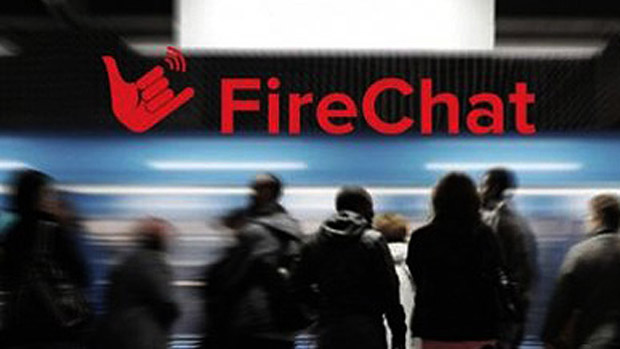FireChat: what is it and how is it powering the Hong Kong protests?
Peer-to-peer app FireChat is helping Hong Kong's protesters communicate without internet access or mobile phone coverage

A free daily email with the biggest news stories of the day – and the best features from TheWeek.com
You are now subscribed
Your newsletter sign-up was successful
Since pro-democracy protesters took to the streets in Hong Kong, China has been blocking protest discussions on Weibo, China's equivalent of Twitter, and limiting access to the picture-sharing service Instagram.
With China's online censors monitoring communication online, many Hong Kong protesters have turned to an app called FireChat, which was downloaded by 100,000 people in Hong Kong last weekend.
What is FireChat?
The Week
Escape your echo chamber. Get the facts behind the news, plus analysis from multiple perspectives.

Sign up for The Week's Free Newsletters
From our morning news briefing to a weekly Good News Newsletter, get the best of The Week delivered directly to your inbox.
From our morning news briefing to a weekly Good News Newsletter, get the best of The Week delivered directly to your inbox.
FireChat is a peer-to-peer "mesh networking" communication tool that allows people to connect to one another through Bluetooth, rather than having to send messages via a central server or mobile tower.
Why has it become popular with Hong Kong's protesters?
The main benefit of FireChat is that it allows you to keep in touch with nearby friends, even if you have lost access to the internet. It can also help you maintain connections in areas where mobile networks are congested.
Using Nearby mode, FireChat connects phones to one another via direct connection instead of sending signals through mobile phone towers. The peer-to-peer network's basic range is about 40 to 70 metres, but messages can be sent to more distant friends by bouncing through other intermediate devices that are also connected. So as more people connect to one another, messages can reach further.
A free daily email with the biggest news stories of the day – and the best features from TheWeek.com
According to VentureBeat, FireChat users in Hong Kong were involved in more than 800,000 chat sessions over the past day. But this figure only accounts for chats that took place while users were connected to the internet – it is impossible to know how many more happened between people who were entirely offline.
"We have no sense of how big the mesh networks have gotten," FireChat's chief marketing officer Christophe Daligault told VentureBeat. "It's like the other side of the moon."
How secure is FireChat?
Not very. In fact everything that you say on FireChat is completely public. However, according to FireChat's parent company, Open Garden, there are currently plans to introduce encryption to make the service significantly more secure.
Has FireChat been used during other protests?
A huge surge in downloads occurred in March, Forbes notes, when student demonstrators in Taiwan planned to use FireChat to get around an anticipated web shutdown (which in the end, did not happen).
Is the app useful in any other circumstances?
According to FireChat, the app can be used "on the beach or in the subway, at a big game or a trade show, camping in the wild or at a concert, or even travelling abroad." It is at its most useful when there are a large number of people using the app simultaneously, but it can also allow communication between friends in relatively close proximity who have no internet access or mobile signal.